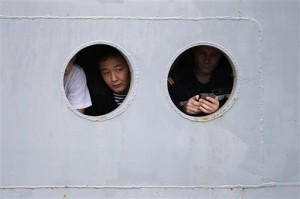Russian sailors leaving France without warship

Russian sailors peer from portholes of the Russian navy ship Smolny as it leaves the port of Saint-Nazaire, western France, Thursday, Dec.18, 2014. Russian sailors are leaving the French Atlantic port without the controversial French-made warship they were supposed to sail away on. France suspended the delivery of the ship to Russia “until further notice” last month because of the conflict in Ukraine. (AP Photo/Laetitia Notarianni)
PARIS — Hundreds of Russian sailors pulled out of a French port Thursday, bearing perfumes for their loved ones but lacking the controversial bounty they came for: a 1-billion-euro, French-built warship that has become a hostage to the biggest East-West conflict since the Cold War.
The Vladivostok helicopter carrier is part of a strange and divisive arms deal now on hold — and perhaps on the verge of collapse — because of the conflict in Ukraine. France built it for Russia’s navy but is now having second thoughts, notably amid heavy U.S. criticism of the deal.
After months training on the ship, the Russian sailors left the port town of Saint-Nazaire empty-handed. The ship, painted with Cyrillic letters reading “VLADIVOSTOK,” floats in a dock, unused. A second ship meant to be part of the deal is there, too, an expensive diplomatic embarrassment.
A top French official involved in negotiating the sale in 2009, former Defense Minister Herve Morin, is now opposed to it. His change of heart reflects Europe’s evolving relationship with Russia, a powerful neighbor, trading partner and energy supplier.
It also reflects divisions inside France. Then-President Nicolas Sarkozy crafted the sale as much for domestic economic reasons as for geopolitical ones.
Article continues after this advertisementThe contract saved a shipbuilder at risk of bankruptcy at a time when Sarkozy was trying to shore up the economy. “The Mistral-class deal was viewed as an unexpected lifeline” for STX France, 33 percent owned by the French state, Morin said.
Article continues after this advertisementIt also fit with Sarkozy’s policy of outreach to authoritarian leaders shunned by the West.
Russia’s president at the time, Dmitry Medvedev, called it “a symbol of trust between our countries” as Russia sought to modernize its over-stretched and outdated military machine.
The sale of the ships — which could allow Russia to land hundreds of troops quickly on foreign soil — worried Russia’s neighbors, including the three Baltic countries in NATO.
Morin, who took part in the negotiations in 2009-2010, told The Associated Press, “Some were for and against around the table. In the end, Sarkozy arbitrated, saying: ‘We do it.'”
Today, Morin admits he has changed his mind. “It was a political gesture when we signed the deal, it is a political gesture, too, when we deliver it” — or not, he said.
The deal has become a liability for Sarkozy’s Socialist successor Francois Hollande. In August he put it on hold, saying “conditions haven’t been met” to deliver the ship. In November he said formalized the suspension “until further notice.”
Hollande still hasn’t taken a definitive decision on the contract that was supposed to be the biggest arms sale by a NATO country to Russia. The French president bound any potential delivery to the situation in Ukraine, insisting on the restoration of territorial integrity. Russia annexed the Crimean Peninsula, and is accused of backing separatists in eastern Ukraine.
Some in France say Hollande should hand the ship over. Jean-Louis Bianco of Sarkozy’s conservative party UMP was among several French legislators at a recent Russian Embassy event who decried the suspension of the deal.
“Can you imagine this happening under de Gaulle? That someone would lie down for the Americans like this?” he asked.
Russia agreed to wait until February for a final decision, while France risks having to pay over 1 billion euros for not fulfilling the contract, according to a top French official and a Russian diplomat. The French official said Russia has already paid a substantial part of the 1.2 billion euros ($1.48 billion) deal. They spoke anonymously because they were not authorized to disclose details of the deal.
Christophe Morel of STX, the company that built the warships, expressed concern about France’s reputation as an arms exporter.
“If we don’t deliver them, it’s the entire French defense industry on the hot seat,” he said.
France was the fifth-largest arms exporting country in 2009-2013, representing 5 percent of global exports — behind the U.S. (29 and Russia (27%), according to the Stockholm International Peace Research Institute (SIPRI).
In Saint-Nazaire port, the two impressive ships are visible but protected by barbed-wire fence and guards. The Mistral-class vessels can carry 700 troops, 16 helicopter gunships and up to 50 armored vehicles.
The second warship, ironically named the Sevastopol after a port in Crimea, is due to be ready in autumn 2015.
About 400 Russians — composing two crews for the two warships — arrived in Saint-Nazaire on June 30. They trained on the Vladivostok, on the ground and at sea, as part of the deal. They could be seen coming and going in uniform to their training, or practicing sport activities.
They used free time to go to the center of the city of 67,000 inhabitants.
“They are quite discreet,” said Anne Montgeron, 22, a saleswoman in a cosmetic shop. When they came seeking French souvenirs, she said, “I help them choose some nice gifts for their wives,” for example Chanel or Dior perfumes.
While on the French coast, the Russian sailors slept and ate on their own ship, the Smolny — which pulled out of port at high tide Thursday and is now sailing them home.